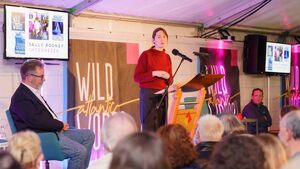Author Sally Rooney among objectors to proposed Data Centre

Sally Rooney speaking at the reading and book signing of her book, Intermezzo at the Wild Atlantic Words literary festival. Photo: John Mee Photography
Bestselling author Sally Rooney is among those who have lodged objections to the development of a proposed data centre at Killala in North Mayo.
Mayo Data Hub Ltd submitted a planning application to Mayo County Council last November for the construction of a 29,076 square metre single-storey data centre building at Killala Business Park including data halls, electrical and mechanical plant rooms and other associated ancillary works.
The proposed development will also include provision for 56 car parking spaces, including 12 electric vehicle (EV) charging spaces, 20 cycle parking spaces as well as footpaths and cyclists' infrastructure.
The site was previously home to the Asahi synthetic fibre plant, a major employer in the region from the mid-1970 up to its closure in 1997.
Several submissions have been received about this planning application and among them is one from Ms Rooney, the author of the best-selling novels and .
The Castlebar native urged the local authority to refuse planning permission for what she described as a "wasteful, unnecessary and environmentally toxic proposal".
“In 2023, private corporate data centres accounted for 21% of Ireland’s total electricity usage – more than all urban households combined,” she said in a detailed submission. “Residential electricity use actually fell between 2022 and 2023, as ordinary Irish people used less power, but overall electricity usage still grew – driven by data centres.”
Ms Rooney raised several objections, including over an increase in carbon emissions she said would arise from the proposed development.
“Because the projected carbon emissions of this project are so high, the applicants will be required by law to ‘offset’ those emissions through ‘carbon credits’.
“Setting aside the complex legal instruments involved here and simply paying attention to the basic physics, this means [that] greenhouse gases will in fact be emitted.”
She said a data centre such as this would be "a waste of energy".
“Data centres wreak environmental destruction without providing much social, economic or cultural value at all.
“What do these centres actually do? They facilitate internet use and store data. No doubt, the internet is an important part of contemporary life, and our emails and photographs have to be stored somewhere.
“But in 2015, data centres accounted for 5% of Ireland’s energy usage; they now account for over 20%. This gigantic proliferation of data centres has not been matched by any meaningful improvement in the quality or accessibility of internet services, never mind a fourfold improvement.
"On the contrary, the internet was in many ways more accessible, faster and easier to use than it is now, because of the massive growth in energy-intensive advertising in the intervening years.
"The truth is that these data centres exist largely to support online advertising.
"Some estimates suggest that online ads account for 50% of internet data usage; others put the figure between 60% and 80%. Whatever the specific figure, online advertising is extremely energy-intensive and is increasing in scale all the time, requiring more data centres, more energy, and more fossil fuels.
"Advertising, needless to say, is pointless. It adds no value to the real economy. It does not improve overall quality of life for anyone. It is an utter waste of resources. At the best of times, this seems a shame; at a time of urgent global crisis, it is a catastrophe."
Ms Rooney expressed concern over the risk of blackouts that may arise from a data centre in this location.
“By increasing the pressure on the grid, data centres like this one run the risk of triggering power blackouts for the rest of us. EirGrid already bans new electricity connections for data centres in Dublin for this reason.
“Not only would this proposed data centre represent a wasteful use of precious and limited electricity; it could also endanger that vital resource for other users, including hospitals and homes.
“I urge you in the strongest possible terms to refuse planning permission for this wasteful, unnecessary and environmentally toxic proposal,” she concluded.
Ms Rooney’s submission echoes sentiments expressed by her in an article for last November when she warned about the ‘apocalyptic’ threat posed by climate change. Her submission is one of several to be received in opposition to the proposed project.
A submission sent in by Chris Stark, a resident of Lahardane, expressed concerns that the data centre would partly rely on the national grid for power and would therefore still use fossil fuels which, he said, contravenes Ireland’s climate change obligations.
“The granting of permission to data centres cannot be justified if the plant cannot be entirely powered by renewable energy, as it will lead to an increase in Ireland’s greenhouse gas emissions (GHG) between now and 2030, contravening the Climate Act, Climate Action Plan, National Planning Framework and MCC’s own Climate Change Adaptation Strategy 2019-2024,” he said.
Other submissions such as the one made by Not Here Not Anywhere, a campaigning group seeking to end fossil fuel exploration, focused on the environmental impact of the proposed development and the overall impact on the climate.
Another submission focused on a lack of engagement with the local community prior to planning and a number of items the objector felt were omitted from the planning application.
A decision on this planning application is due on January 24.





